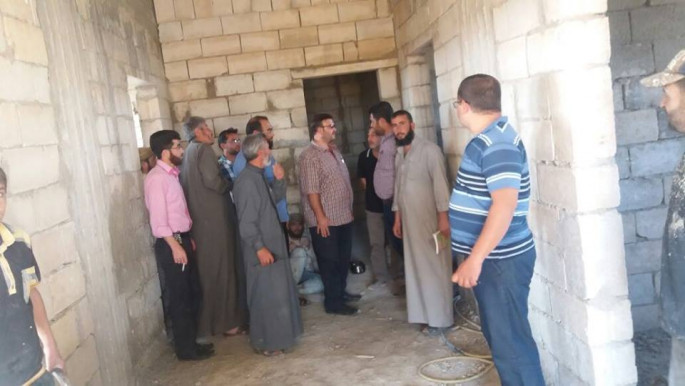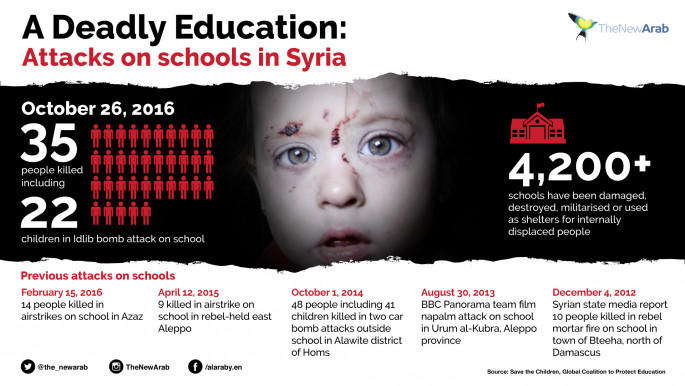
Bomb our schools in Syria? We'll build more
Although the Assad regime and its allies have a long track-record of bombing schools in Syria - most recently the aerial attacks on a school compound in Hass, in which 22 children were killed - people across opposition-held areas continue to prioritise education.
After all, according to conservative estimates, more than half of the students in opposition areas are currently not enrolled in school. To that end, and after a long process, Tamkeen recently constructed - and subsequently handed-over to the local council - an elementary school in Maasaran, a village in Idlib province, notably just 25km east of Hass.
Tamkeen ["Empowerment" in Arabic], is a DfID-funded programme that supports governance and development of 44 communities in the opposition-held areas of Syria, from Daraa and rural Damascus to Idlib and Aleppo.
"Tamkeen Committees" are composed of local experts and community leaders who assist in the development and implementation of various education, infrastructure, health, and good governance projects that, upon completion, are handed-over to local councils - the elected governance bodies that administer towns and villages in opposition territory.
As Tamkeen's South Idlib Area Manager, I manage 51 projects across five towns - among them Maasaran (and also Hass). The project to construct a school in Maasaran is one of these projects.
What seperates Tamkeen from others is that, not only do we seek to continue the provision of essential services, but we work closely with the residents and local councils of each community. By placing a high importance on thorough engagement, we improve collaboration between local stakeholders and help to strengthen the sense of unity.
 |
| Visit by the local council to one of the projects [F.J.] |
We do not impose projects on communities; rather, the residents of these communities vote on priorities, and then develop detailed project plans.
Before any project is approved and implemented, the project plan goes through rigorous technical and financial vetting by various stakeholders, first and foremost the residents of any given area.
During the summer of 2016, the people of Maasaran held multiple public meetings with the local Tamkeen Committee and eventually agreed to pursue four projects: two of them to support and rehabilitate water infrastructure, one to support a medical laboratory, and the final to construct a school on the outskirts of Maasaran, where 80 families live.
But due to the Assad regime's policy of targeting educational centres, obtaining programme approval for the project was not easy. The people of Maasaran, though, were adamant that this school be built, because the only one nearby was over-capacity and dangerous for many children to access.
After meeting with local engineers, teachers, and administrators, we developed a comprehensive $13,000 plan to construct a new school on a small plot of land on the outskirts of Maasaran.
 |
The construction of the school, named Tamkeen al Jil, or, 'Empowering the Generation', was completed on October 23, and, on October 24, it was handed over by the Tamkeen Committee to the Maasaran Council's Educational Office |  |
Although Tamkeen's role in this project was limited to construction, the project plan was reviewed by infrastructure and education experts at Tamkeen.
Despite regular community engagement and the input of many experts, the fact that schools are high-risk targets has caused many development workers operating in Syria to question the viability of such projects. Thus, to show our commitment to education, the residents of Maasaran held additional public meetings and "re-voted" for this project, while field staff subsequently revisited the stakeholders to obtain additional documentation in support of our case.
In the end, the local council, the Tamkeen Committee, the local court, the parents of the school children, and the owner of the Maaziyan farm all submitted individual letters to reiterate their desire to see the school built, and only then was final approval for the project awarded.
The construction of the school, named Tamkeen al Jil, or, "Empowering the Generation", was completed on October 23, and, on October 24, it was handed over by the Tamkeen Committee to the Maasaran Council's Educational Office, which will manage the administration of the school.
 |
|
| [click to enlarge] |
Tamkeen Generation will open its doors during the first week of November, providing an education to 185 elementary students in Maasaran.
The planning, approval and implementation of this project took much deliberation, many sleepless nights, and several months of work. But in hindsight, the back-and-forth between stakeholders demonstrates how serious community engagement can lead to effective and meaningful change.
By encouraging public scrutinty and inviting widespread participation, we slowly foster the kind of unity, transparency and political accountability that is absent in Assad's Syria. The lessons learned now create lasting impacts for our future - impacts that cannot be bombed or jailed.
The construction of a school will not end the Syrian conflict, but humbly, here is what it will do:
First, it proves that external development workers and internal field staff can work together in a transparent way to support the development and stabilisation of local communities in conflict areas. Second, it further demonstrates that, contrary to the "Assad or IS" binary narrative, decentralised local councils and local stakeholders have the ability to provide, maintain, and many times even improve service delivery.
Third, and perhaps most importantly, it shows that, despite the regime's fear and intimidation tactics - like bombing a school compound in nearby Hass - we Syrians are determined to provide an education to our children. We will build other schools in Hass, and, if and when necessary, we will build more schools in Maasaran too.
Faress Jouejati is a former professor of political economy at George Washington University, and now manages the governance and development projects of a series of towns in south Idlib, Syria.
Follow him on Twitter: @farGar





 Follow the Middle East's top stories in English at The New Arab on Google News
Follow the Middle East's top stories in English at The New Arab on Google News


